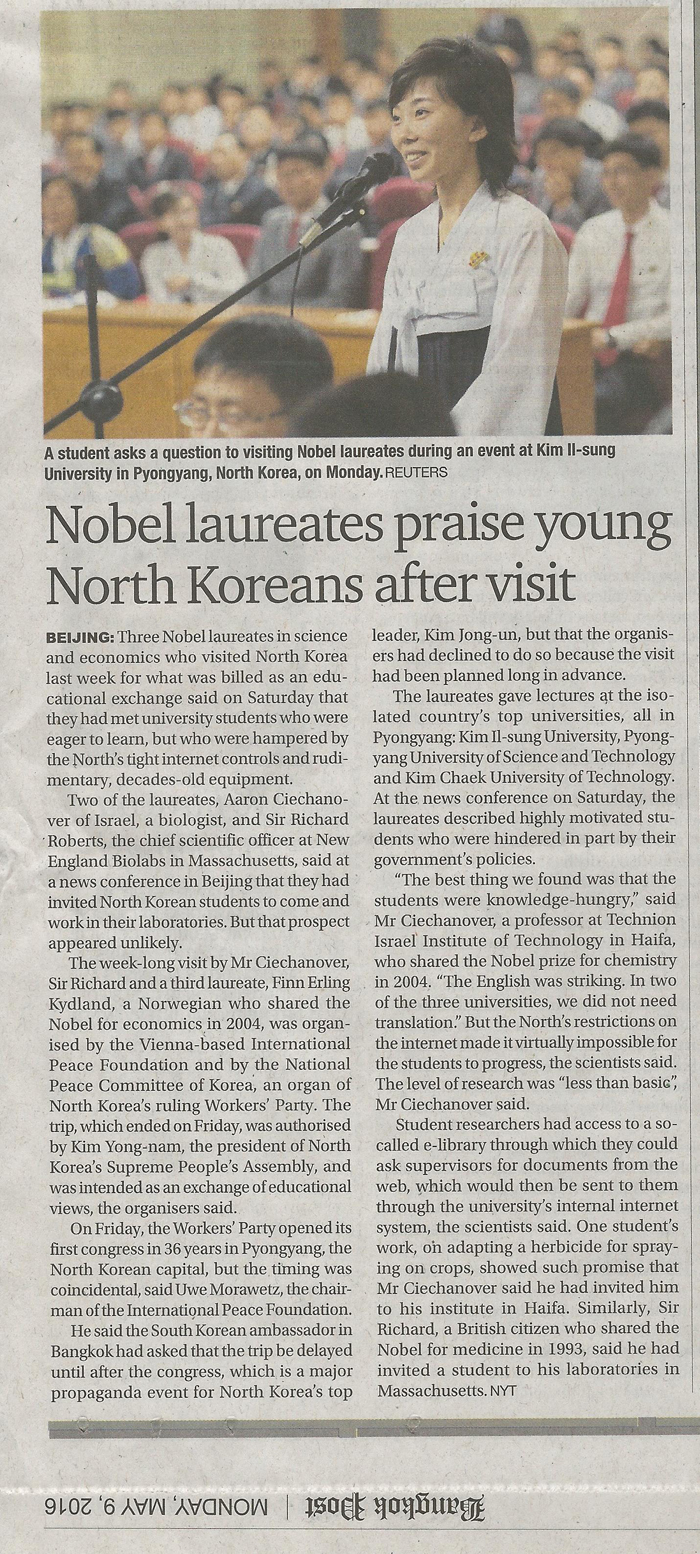|
| |
 |
|
Nobel laureates praise young North Koreans after visit
|
Bangkok Post
May 9, 2016

BEIJING: Three Nobel laureates in science and economics who visited North Korea last week for what was billed as an educational exchange said on Saturday that they had met university students who were eager to learn, but who were hampered by the North's tight internet controls and rudimentary, decades-old equipment.
Two of the laureates, Aaron Ciechanover of Israel, a biologist, and Sir Richard Roberts, the chief scientific officer at New England Biolabs in Massachusetts, said at a news conference in Beijing that they had invited North Korean students to come and work in their laboratories. But that prospect appeared unlikely.
The week-long visit by Mr Ciechanover, Sir Richard and a third laureate, Finn Erling Kydland, a Norwegian who shared the Nobel for economics in 2004, was organised by the Vienna-based International Peace Foundation and by the National Peace Committee of Korea, an organ of North Korea's ruling Workers' Party. The trip, which ended on Friday, was authorised by Kim Yong-nam, the president of North Korea's Supreme People's Assembly, and was intended as an exchange of educational views, the organisers said.
On Friday, the Workers' Party opened its first congress in 36 years in Pyongyang, the North Korean capital, but the timing was coincidental, said Uwe Morawetz, the chairman of the International Peace Foundation.
He said the South Korean ambassador in Bangkok had asked that the trip be delayed until after the congress, which is a major propaganda event for North Korea's top leader, Kim Jong-un, but that the organisers had declined to do so because the visit had been planned long in advance.
The laureates gave lectures at the isolated country's top universities, all in Pyongyang: Kim Il-sung University, Pyongyang University of Science and Technology and Kim Chaek University of Technology. At the news conference on Saturday, the laureates described highly motivated students who were hindered in part by their government's policies.
"The best thing we found was that the students were knowledge-hungry," said Mr Ciechanover, a professor at Technion Israel Institute of Technology in Haifa, who shared the Nobel prize for chemistry in 2004. "The English was striking. In two of the three universities, we did not need translation." But the North's restrictions on the internet made it virtually impossible for the students to progress, the scientists said. The level of research was "less than basic", Mr Ciechanover said.
Student researchers had access to a socalled e-library through which they could ask supervisors for documents from the web, which would then be sent to them through the university's internal internet system, the scientists said. One student's work, on adapting a herbicide for spraying on crops, showed such promise that Mr Ciechanover said he had invited him to his institute in Haifa. Similarly, Sir Richard, a British citizen who shared the Nobel for medicine in 1993, said he had invited a student to his laboratories in Massachusetts.
|
|
|
